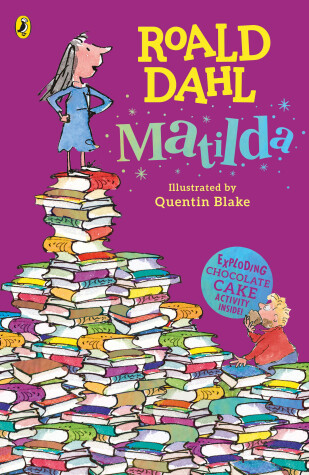
"A true genius . . . Roald Dahl is my hero" - David Walliams
"So Matilda's strong young mind continued to grow, nurtured by the voices of all those authors who had sent their books out into the world like ships on the sea. These books gave Matilda a hopeful and comforting message: You are not alone."
Matilda is the world's most famous bookworm, no thanks to her ghastly parents.
Her father thinks she's a little scab. Her mother spends all afternoon playing bingo.
And her headmistress, Miss Trunchbull?
She's the worst of all.
She's a big bully, who thinks all her pupils are rotten and locks them in the dreaded Chokey.
Despite these beastly grownups trying to push her down, Matilda is an extraordinary girl with a magical mind.
And she's had enough.
So all the terrible adults had better watch out, because she's going to teach them a lesson they'll never forget!
Now you can listen to MATILDA and other Roald Dahl audiobooks read by some very famous voices, including Kate Winslet, David Walliams and Steven Fry - plus there are added squelchy soundeffects from Pinewood Studios!
- ISBN10 0141365463
- ISBN13 9780141365466
- Publish Date 11 February 2016 (first published 1 January 1989)
- Publish Status Out of Print
- Out of Print 12 September 2022
- Publish Country GB
- Publisher Penguin Putnam Inc
- Imprint Puffin
- Edition Colour Edition
- Format Paperback (B-Format (198x129 mm))
- Pages 256
- Language English
- URL https://penguinrandomhouse.ca/books/isbn/9780141365466
Reviews


nannah
Book content warnings:
lesbophobia (specifically anti-butch)
sexism & misogyny
fatphobic
child abuse mention
suicide mention
Ugh. I'm so disappointed. It's one of those things you loved when you were little, only to discover it's incredibly problematic and lackluster when you grew up.
For one, the tone is so fatphobic it's sometimes hard for me to read the book without contempt. Many of the book's characters the audience are supposed to like are continuously described as "small", "thin", "tiny", etc., while the villains are fat and large and bulging. Fat people are described with such disgust that I'm just revolted by the author. I know this wasn't written recently, but it's just hard to read.
Not only that, but this author seems to project his own anti-feminist, anti-butch lesbian views onto this children's book. Miss Trunchbull is literally the personification of the radical feminist of his time: ugly, manly, large and bulky. She acts like a man, too, participates in what could be seen as stereotypical men's sports, has no need for marriage - in fact, she looks down on it when one of the children sings back Miss Honey's rhyme "Mrs. D Mrs. I Mrs. F F I, etc." and Miss. Trunchbull exclaims "Why are all these women married?".
Miss Trunchbull also hates anything feminine (aka the little girl /growing out/ her pigtails), and hates children. She also literally killed the patriarch of her family so she could be in charge. Reading this as a butch lesbian myself just made me roll my eyes every other page.
The plot started slowly, and then rushed faster and faster until the end just ... happened, and I was left feeling like the book ended without actually finishing, if that makes sense. There was no feeling of an actual conclusion.
And the relationship between Miss Honey and Matilda made me incredibly uncomfortable. The prose even mentions Matilda as a grown-up child rather than an actual child. And that Matilda and Miss Honey were equals. Which could make their relationship ... really weird. It's basically how Miss Honey "opens up" about her past. But she really just blurts out "my father killed himself" to a six-year-old girl. This all reads so awkwardly and worryingly. It doesn't matter if this kid is the most intelligent girl in the world, of all time! She's still a child.
Anyway, yeah ... I didn't enjoy this.

mrs_mander_reads

Chelsea

celinenyx

KitsuneBae
I don’t know about you but my Y/A years have been in a way shaped by Roald Dahl and his stories. Roald Dahl may have come late into my life—with me preferring to spend my childhood playing under the sun rather than read book indoors—but they never failed to remind me of the importance of goodness and that unpleasant deeds would always reap retribution either directly or indirectly. And this perhaps is best conveyed by Roald Dahl’s Matilda.
The story of Matilda brings us to the lives of the Wormwood family members who—except for Matilda—were not only crooked but cruel as well. Mr. and Mrs. Wormwood were so immersed in their world of crookedness that they failed to see that they have been blessed with a gifted child, Matilda. Instead of praising Matilda’s feat of brilliance, they thought that she was an ignorant little twit. And as if the gods are conspiring against her, Matilda’s headmistress—the Trunchbull—at school was ten times more horrible and whose favorite plaything were kids. Matilda must rise up to the challenge and get rid of the Trunchbull for good.
While full of engaging and humorous scenes, Matilda is an honest story about the two faces of human nature, the good and the bad. The early chapters gave us a clear picture that cruelty starts at home. Mr. and Mrs. Wormwood’s refusal or more likely ignorance of Matilda’s gift and chastising her for being an annoying chatterbox is already tantamount to child abuse. And this became even clearer when they decided to leave Matilda behind without a qualm. Then there’s the ugly side of leadership represented by the menacing Trunchbull who was not only a usurper but a big time bully as well who will definitely ruin a kid’s childhood.
On the other hand, despite growing up in a dysfunctional household, Matilda remained pure and rose from the baser nature of human ugliness. Her principle as young girl is no mean as she refused to be corrupted by her parents’ shady ways. Instead, she assertively took actions to ensure that the bullies got their own dose of medicine. Matilda’s ingenuity, courage and compassion are the things that really draw me to it. The laughter and the fluffiness were just an added bonus.
Matilda will surely captivate the hearts of the readers.

